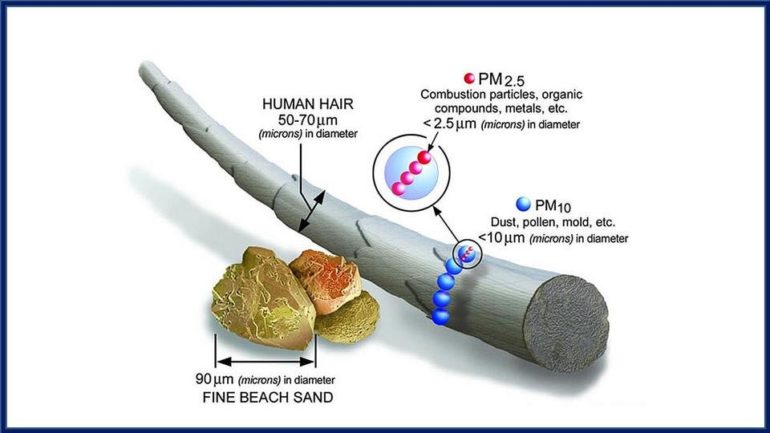Chronic rhinosinusitis (CRS) is a 12-week or longer condition during which the sinuses get infected or irritated, become swollen, are severely congested and secrete mucus into the throat. CRS also can cause facial pain, pressure and loss of smell, and in some cases, it may be associated with depression, anxiety, impaired sleep and low quality of life. Although the factors leading to CRS are unknown, Johns Hopkins Medicine researchers have provided what may be the first evidence that long-term exposure to tiny particulate air pollution is one of them.
A report on the findings was published June 28, 2021, in the American Journal of Respiratory and Critical Care Medicine.
“We assessed patients experiencing chronic rhinosinusitis in areas where exposure to environmental air pollution known as PM2.5—inhalable, particulate matter less than 2.5 micrometers in size [about 30 times smaller than the diameter of a human hair]—may have been high,” says lead author Murugappan “Murray” Ramanathan, M.D., rhinologist and associate professor of otolaryngology-head and neck surgery at the Johns Hopkins University School of Medicine.
According to the U.S. Environmental Protection Agency (EPA), PM2.5 (the PM stands for “particulate matter”) is the term for a mixture of solid particles and liquid droplets found in the air. PM2.5 consists of many materials that vary with location, including dust, dirt, soot, smoke, organic compounds and metals. It has been linked to cardiovascular disease, lung cancer, decline in cognitive thinking ability, chronic obstructive pulmonary disease, asthma and premature death.
Previous research by Ramanathan and his team linked PM2.5 to loss of smell.
In their latest study, the Johns Hopkins Medicine researchers looked at a population of 6,102 patients age 18 and older, including 2,034 with CRS who did not have the disorder for up to five years before it was diagnosed. Mean PM2.5 exposures were calculated for each patient based on his or her residential address postal code at 12, 24, 36 and 60 months prior to CRS diagnosis.
Air pollution data for the study came from the EPA’s Air Quality System. The researchers fed the data into a complex computer model—incorporating meteorological and satellite-based environmental measurements, land-use information and simulations of airborne chemical movement—to estimate the PM2.5 pollution levels within the participants’ residential ZIP codes. The model was created by study lead author Zhenyu Zhang, a Johns Hopkins Medicine otolaryngology postdoctoral fellow.
The research team found that patients exposed to higher PM2.5 concentrations over a long period of time were more likely to be diagnosed with CRS, regardless of how the exposure occurred. For example, exposure over 60 months was associated with an approximately one-and-a-half-fold increase in developing the disorder. There also was a nearly five times greater risk of developing severe pansinusitis (inflammation in all four sinuses).
“To our knowledge, this is the first study to report that long-term exposure to fine particulate matter air pollution increases the odds of developing CRS, particularly the most severe form of the disease,” says Ramanathan.
This research validates a 2017 study by Ramanathan’s team demonstrating that long-term PM2.5 exposure in mice resulted in chronic sinonasal inflammation.
The Johns Hopkins Medicine team is conducting ongoing research to seek a better understanding of how race and socioeconomic status may contribute to air pollution exposure, and in turn, development of chronic rhinosinusitis.
Researchers show how air pollution may contribute to loss of smell
More information:
Zhenyu Zhang et al, Long-Term Exposure to Particulate Matter Air Pollution and Chronic Rhinosinusitis in Non-Allergic Patients, American Journal of Respiratory and Critical Care Medicine (2021). DOI: 10.1164/rccm.202102-0368LE
Provided by
Johns Hopkins University School of Medicine
Citation:
Researchers show how air pollution may cause chronic sinusitis (2021, July 29)
retrieved 30 July 2021
from https://medicalxpress.com/news/2021-07-air-pollution-chronic-sinusitis.html
This document is subject to copyright. Apart from any fair dealing for the purpose of private study or research, no
part may be reproduced without the written permission. The content is provided for information purposes only.



